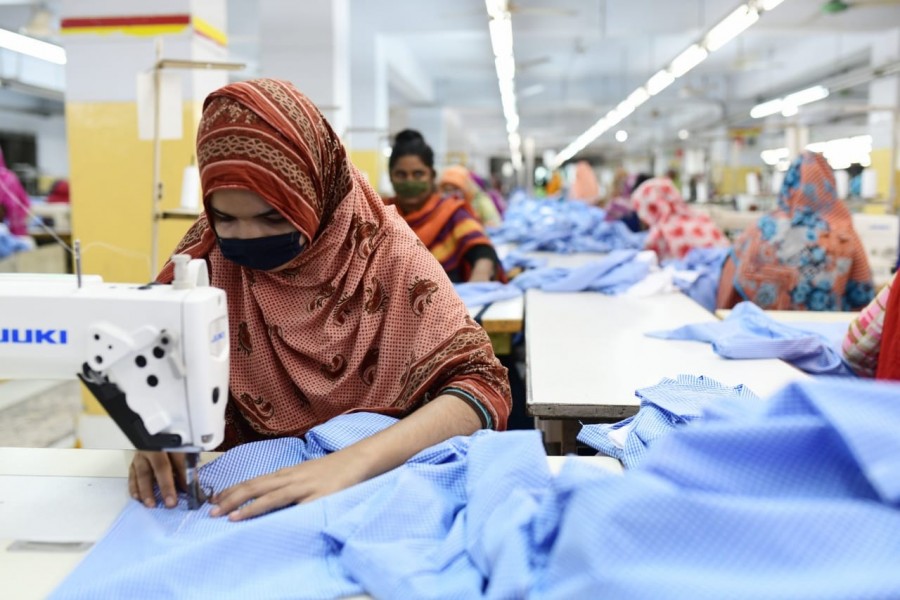
Published :
Updated :

The government should replicate successful RMG (readymade garment) model to all non-RMG sectors, allowing them to become competitive enough to absorb post-LDC graduation-related challenges, businesses and economists pinpointed on Saturday.
Highlighting the importance of signing FTA (free trade agreement) with the key export destinations of Bangladeshi products, they suggested rationalisation of the tariff structure.
At the same time, they also underscored the need for raising productivity and developing human capital quickly to avert possible setback after the graduation.
They made the suggestions at a seminar on the 'Export challenges of Bangladesh after graduation from LDC status: Options for the private sector' hosted by the Federation of Bangladesh Chambers of Commerce and Industry (FBCCI).
Presenting a keynote paper, former member of Bangladesh Tariff Commission Dr Mostafa Abid Khan shared a study where it apprehended that Bangladesh will lose export earnings worth US$6.38 billion annually to its five largest export destinations after its graduation from the least developed country (LDC) category in the form of erosion of preferential trade benefits.
In the post-LDC period, he said, the local exporters will also face 8.91 per cent duty and there is a possibility of losing 26.28 per cent export or US$ 5.28 billion to the EU because of the LDC graduation.
The study was prepared with data from the World Trade Organisation (WTO) on five major export destinations of Bangladesh.
Apart from the EU, Bangladesh will lose $5.36 million or 42.05 per cent of business to Canada where the local exporters will have to face 14.47 per cent duty, according to him.
Similarly, the country will lose $388.12 million or 30.53 per cent trade with Japan where the local exporters will face 8.89 per cent duty in the post LDC period.
Bangladesh will face 7.94 per cent duty and lose business worth $87.78 million or 27.53 per cent of the total annual export to Korea.
In China, there is a possibility of losing $76.55 million or 8.29 per cent of total export because of 2.96 per cent duty on Bangladeshi goods.
In New Zealand, the local exporters will have to face 4.62 per cent duty and lose $10.13 million or 11.90 per cent export in a year, the study also said.
Managing director of Apex Footwear Limited Syed Nasim Manzur said non-RMG sectors are largely ignored here.
"Policies are captured by RMG. I am not against the RMG. RMG sector gets bonded warehouse facility for two years but we are getting one year. Why this discrimination persists?," he said.
Mr Manzur, also former president of Metropolitan Chamber of Commerce and Industry, Dhaka (MCCI), suggested replicating the successful RMG model to other export-oriented sectors that would help raise competitiveness of the non-RMG ones.
CPD research director Dr Khondaker Golam Moazzem said people of the country well be aware of the challenges the country would face once it graduates from the LDC tag.
"Now, the time has come to take effective decisions and implement those because we have not much time," he said.
He was highlighting the importance of carrying out sector-specific discussions on the context of the post-LDC challenges because the nature of the sectors is not similar.
FBCCI president Jashim Uddin urged the government to take the necessary initiative to simplify investment management in all sectors, particularly in the service sector, to meet the post-LDC challenges.
He also called upon the government to ensure services of electricity and gas in all export-oriented industries, and take the required steps to tackle competition in the global market.
Mr Jashim suggested that the government develop skill and capacity of BSTI so that Bangladeshi products get easy access to the international market. He also emphasised product diversification.
Member of Planning Commission under the ministry of planning Sharifa Khan said people often say the country lacks diversified export products, which is very essentials.
"I don't think so. There are too many quality products but the missing link is we cannot transfer or translate those into the export level," she said.
She suggested rationalising the tariff structure to encourage industries about export from domestic market.
Senior secretary to the Ministry of Commerce Tapan Kanti Ghosh said market access is not the problem; the main problem is potential sectors largely concentrate on domestic market riding on the opportunities of high protection.
He laid emphasis on signing FTA and reduction of business cost.
Principal secretary to the Prime Minister Dr Ahmad Kaikaus said the nature of the economy is largely market-oriented and the role of the government is to remove the barriers.
He said there is a time of four years which is short but the four years comprises 1,460 days and 35,000 hours.
"So we can change the dynamics because we are running very fast," he said.
Former chairman of Bangladesh Tariff Commission Dr, Mujibur Rahman said the NBR failed to introduce national single window even after a long time. "Why? Please break the NBR," he suggested.
Industries secretary Zakia Sultana, Country Managing Director of Pricewaterhousecoopers Bangladesh Mamunur Rashid and FBCCI adviser Manzur Ahmed, among others, spoke at the event.
jubairfe1980@gmail.com


 For all latest news, follow The Financial Express Google News channel.
For all latest news, follow The Financial Express Google News channel.